
Original survey data from The Unwinder points to a disconnect between wellness consumers and an evidence-based approach to wellness, and suggests that marketing hype can be confused for supplement effectiveness.
In May and June, we surveyed a representative sample of U.S. consumers*. Our first four questions asked about familiarity and use of four popular categories of wellness supplements: adaptogens, probiotics, CBD, and nootropics.
Then, we asked questions that tested respondents’ actual knowledge of these supplements. For example, “Which of the following supplements help people manage stress?”. If the respondent answered ‘caffeine’, yet had previously reported that they were familiar with adaptogens or CBD, we would know there was a disconnect between what they believed and what is actually true.
Results: High Claims Of Familiarity With Supplements; Mixed Results When Tested On Knowledge
Overall, our respondents expressed significant familiarity with the four categories of wellness products, with about half in each category reporting that they’re “very familiar” with, and “use regularly” the supplements in question.
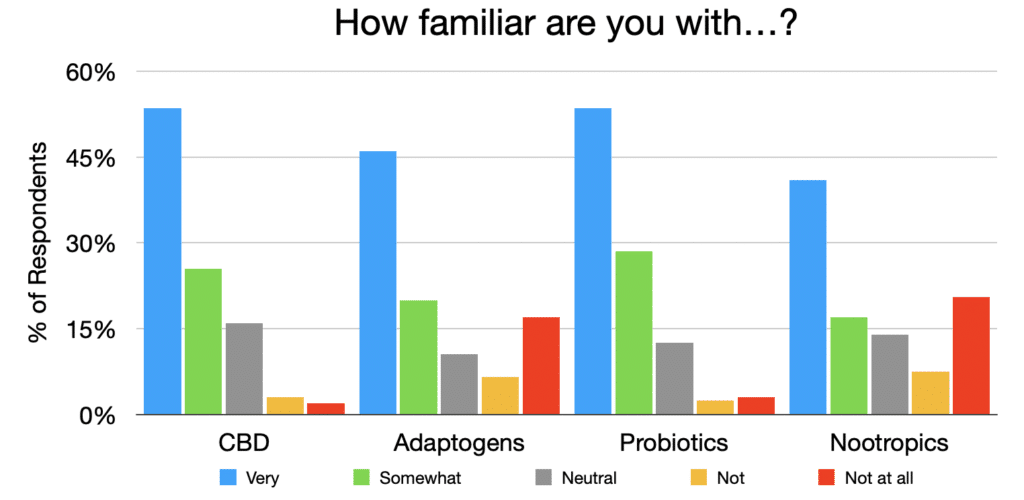
However, when we tested respondents on common use-cases of the same supplements, 42% of all answers were clearly wrong. We presented a list of supplements for each particular “use-case” – sleep, stress, cognitive performance, mood-boosting, and digestive health. Each list contained at least one supplement that is well-known and evidence-backed for that use-case, alongside supplements that have either limited evidence, no evidence, or are actively harmful for that use-case. This latter bit constitutes a wrong answer; for example, citing caffeine as a sleep aid.
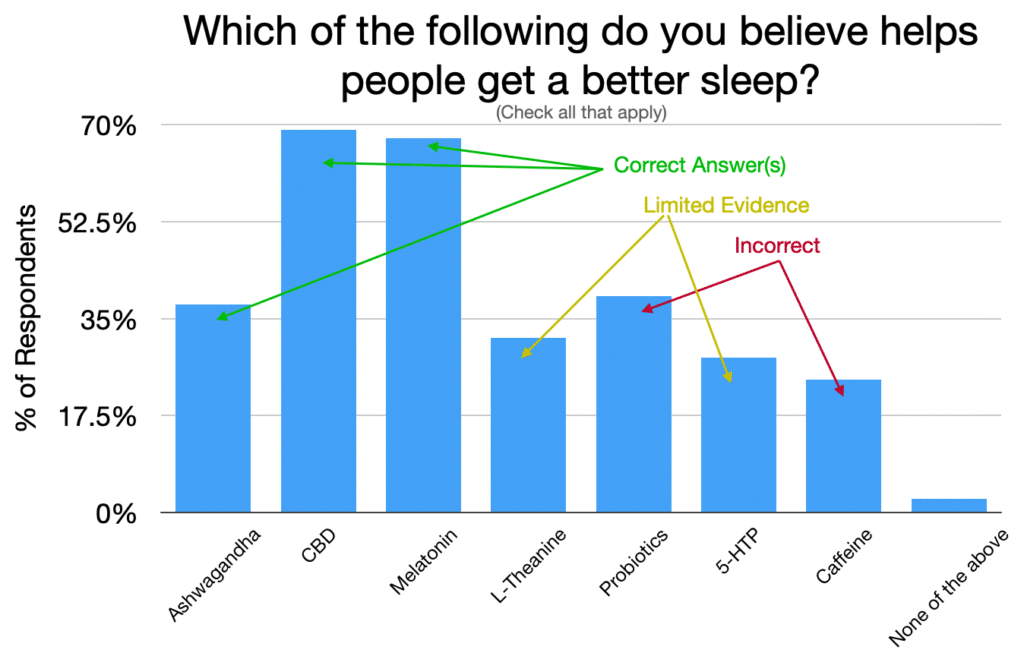
Determining what is evidence-backed fell on The Unwinder’s editorial team, whose day-to-day is reviewing wellness product claims against the outstanding scientific research.
While respondents performed fairly well correctly identifying sleep aids and stress management supplements, while avoiding obviously wrong answers, these same consumers were more confused about supplements for cognitive performance, digestive health, and mood boosting.
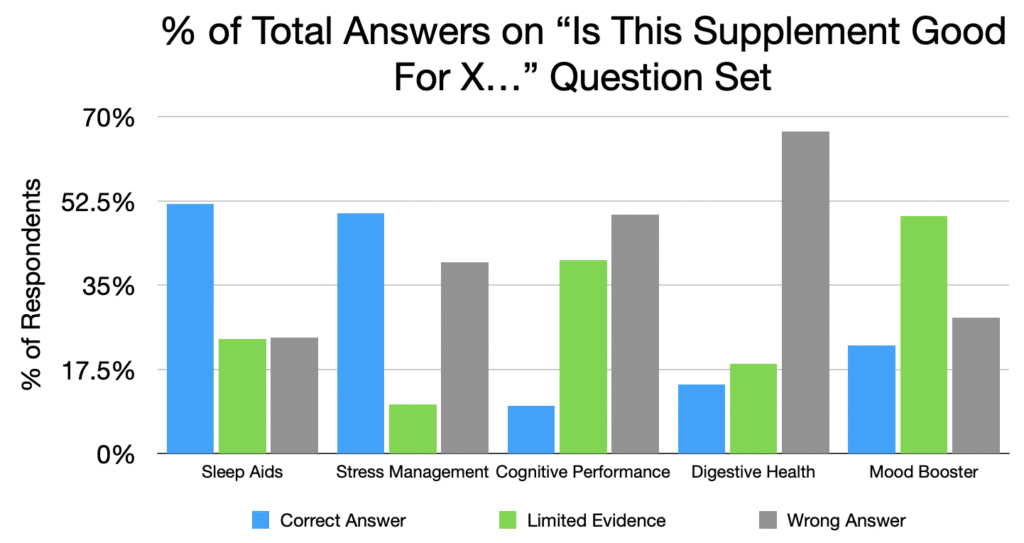
CBD is the most popular choice for stress management, and the broad way “stress” can be defined makes this question an open one. For example, a respondent might have gastrointestinal issues, which cause them stress, and therefore make probiotics a solution to stress. More likely, though, is that they have read not-yet-scientifically-validated mainstream news about the “mind-gut” connection, and interpreted this as meaning probiotics are stress-reducers. Caffeine is known to elevate cortisol levels and produce a stress-like state.
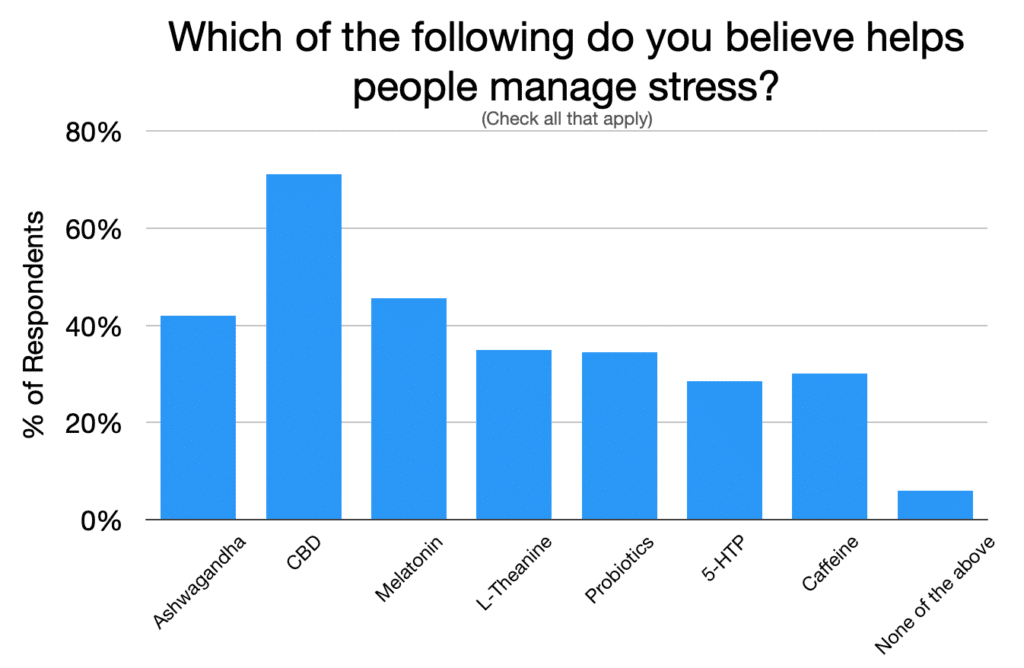
Responses were all over the place regarding cognitive performance. The current state of research suggests that caffeine is the most potent enhancer of cognitive performance.
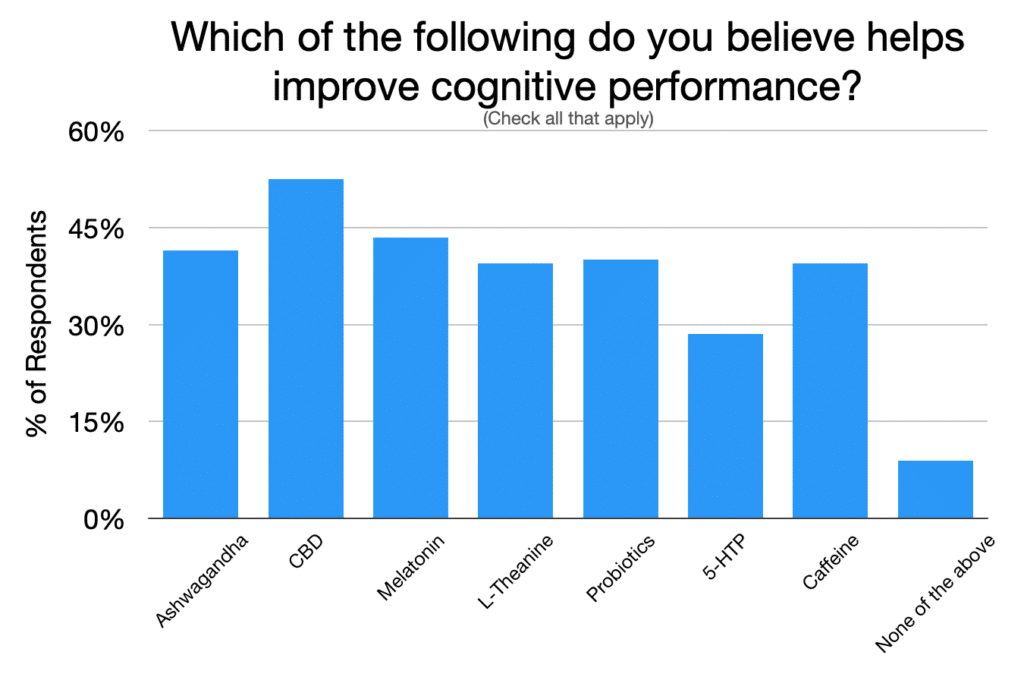
Probiotics are a well-known, common-use supplement often recommended by doctors. Here we see either a CBD halo effect, or general cluelessness. While there is modest evidence for cannabis for treating nausea, the best of our knowledge is that THC is the main anti-nausea chemical.
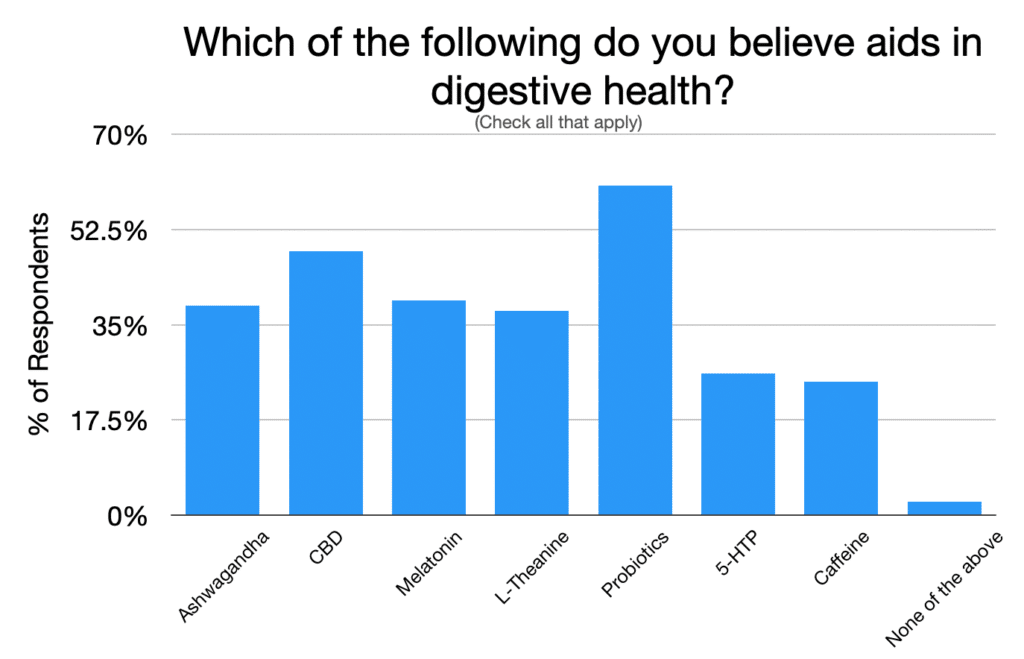
The mood-booster with the strongest research-backing is 5-HTP. (This backing is on a pathway basis at this point, as one major and important study on 5-HTP was retracted last year.) This may be another example of the CBD halo effect, and perhaps similarly so for probiotics (as discussed above, a popular overstatement of the “mind-gut” connection).
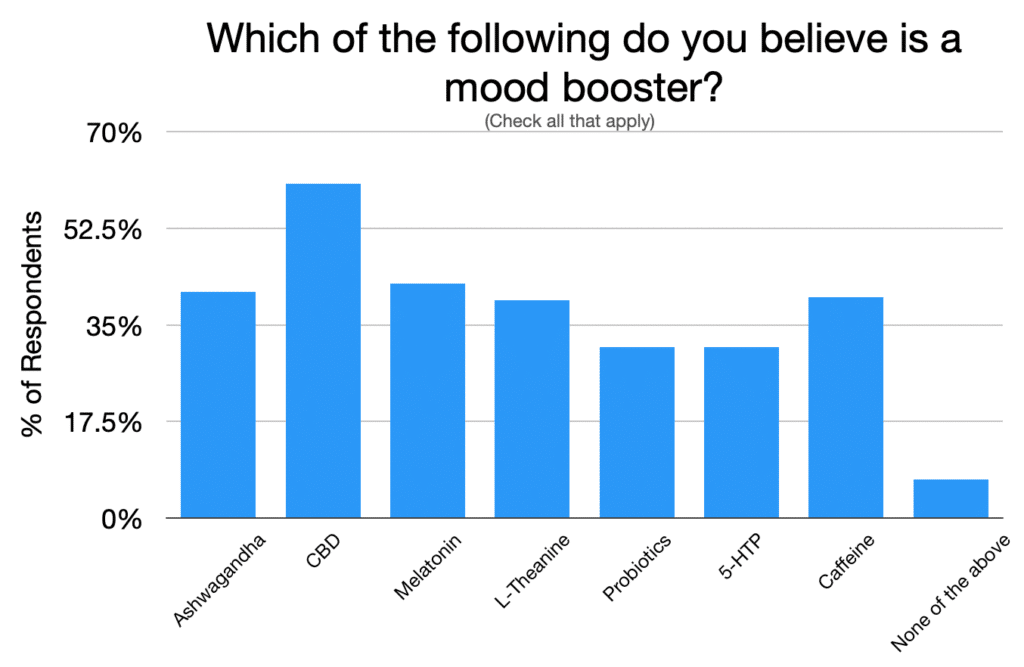
Discussion: Supplement “Hype” Leads To Over-Belief Of Efficacy
It’s crucial to note that the test questions were “check all that apply”. Our goal was to learn how well consumers’ understanding of different wellness supplements aligned with our understanding of where on the evidence-based spectrum each of these supplements fit, for different use-cases.
For example, 60.5% of respondents correctly identified probiotics as a helpful supplement for digestive health. However, 39.5% also selected melatonin as a helpful digestive health supplement, despite the fact that there is no research or pathway-based evidence for melatonin as a digestive aid. In sum, only 21.8% of total supplements selected were correct for the digestive health question.
There are a few explanations for this. One is that because parts of the wellness industry either have low evidentiary standards for their claims, or are less-than-scrupulous in promoting products that don’t work, the consumer has taken on this confusion and “over-believes” in supplements.
For example, respondents highly overrated CBD, which came in as the most chosen supplement for sleep, stress, cognitive performance, and mood-boosting, and second most chosen supplement for digestive health. There is interesting science behind CBD, but no serious wellness practitioner would claim CBD is the best supplement for everything. The CBD hype train is causing people to believe CBD is the right supplement for everything, at the expense of other, better-studied and suited products. This effect seems to persist across all the more popular supplement products—melatonin, probiotics, and to a lesser extent, ashwagandha.
If we sort only by people who said they were “very familiar” or “familiar” with all four of our supplement categories (CBD, adaptogens, probiotics, nootropics), we do get slightly better results:
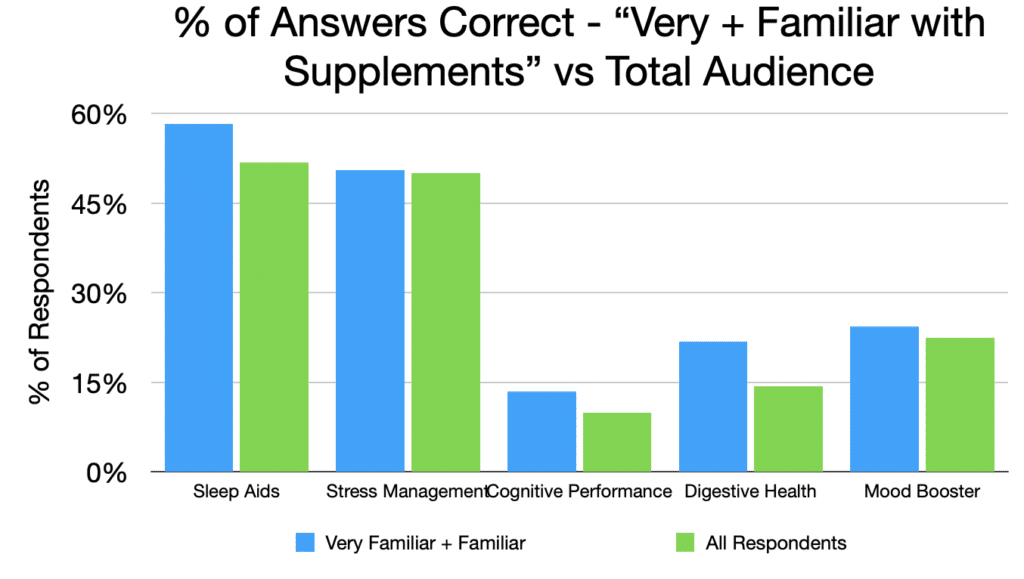
Women answered better than men. Across our five “test” questions, women selected the correct response 12% more often than men. Amusingly, men professed to be “very familiar” with the supplements in question at more than double the rate of women.
For further discussion of study results or further inquiries into the data, email hello@the-unwinder.com.
*Pollfish uses a method called Random Device Engagement with Organic Sampling, surveying people randomly, in organic contexts, based on their unique device IDs as matched to an authentic person, and statistically correcting for ways in which people who respond to surveys can be different than those who don’t. N=200.